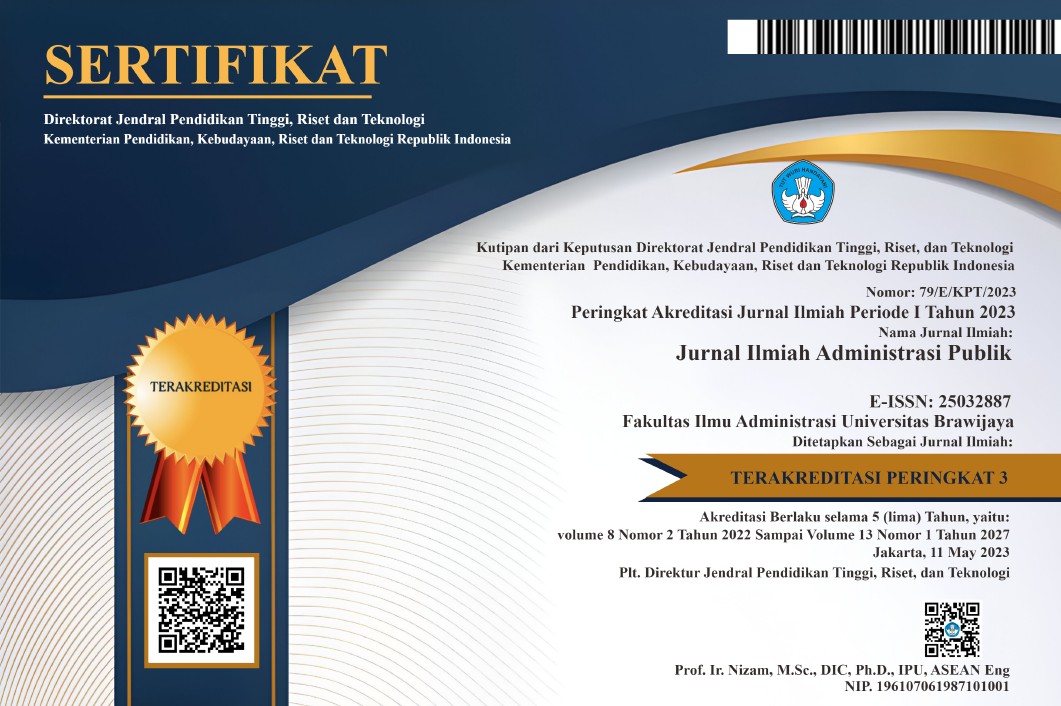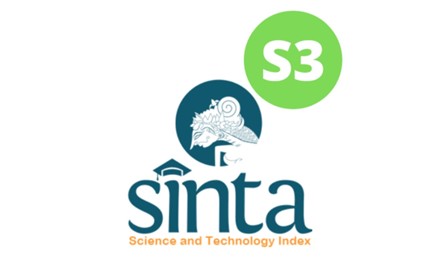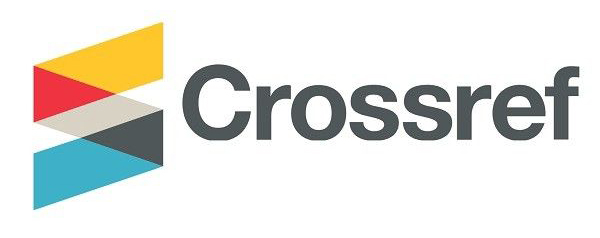Strategy to Improve Accountability and Performance Management in Pamekasan Regency Government
DOI:
https://doi.org/10.21776/ub.jiap.2021.007.03.3Keywords:
improvement strategy, performance management, performance accountability, SAKIPAbstract
The level of accountability for the performance of the Pamekasan Regency Government in recent years has experienced a significant increase, so a strategy is needed so that the value of accountability continues to increase. The purpose of this study is to provide an overview of strategies for improving accountability and performance management in the government in Pamekasan Regency. The results of the study indicate that strategies for increasing accountability and performance management in the Pangandaran Regency Government include the Regional Apparatus Organization conducting a satisfaction survey on the community in each of its services periodically, the need to strengthen SOP (Standard Operating Procedures) in public services, increasing standard adjustments and review programs with community involvement (citizen charter), increasing the intensity level of coordination between regional apparatuses in order to improve public service innovation, providing and managing public complaints facilities, encouraging service innovation in each regional apparatus, and conducting periodic socialization of service evaluation policies.
References
Haryono, & Jering, O. A. (2020). Analisis Penerapan Sistem Transaksi Non Tunai Dalam Meningkatkan Transparansi dan Akuntabilitas Pengelolaan Keuangan Daerah Pemerintah Daerah Kabupaten Landak. JAAKFE UNTAN (Jurnal Audit Dan Akuntansi Fakultas Ekonomi Universitas Tanjungpura), 9(2), 36–48. https://jurnal.untan.ac.id/index.php/jaakfe/article/viewFile/43768/pdf
Irawati, A., & Agesta, C. (2019). Faktor-Faktor Yang Mempengaruhi Akuntabilitas Kinerja. Jurnal Akuntansi Dan Keuangan, 10(1), 56–70. http://jurnalmahasiswa.stiesia.ac.id/index.php/jira/article/download/214/216
Karima, D., Maslichah, & Sudaryanti, D. (2021). Pengaruh Penerapan Sistem Akuntansi Pemerintah Daerah, Pemahaman Akuntansi, dan Ketaatan Pada Peraturan Perundangan Terhadap Akuntabilitas Kinerja Instansi Pemerintah Daerah. Jurnal Ilmiah Riset Akuntansi, 10(6), 10–24. http://riset.unisma.ac.id/index.php/jra/article/viewFile/10682/8416
Kemendikbud. (2021). Pedoman Evaluasi SAKIP. Biro Perencanaan Kementerian Pendidikan, Kebudayaan, Riset, dan Teknologi Republik Indonesia.
LHE. (2019). Laporan Hasil Evaluasi SAKIP.
Libguides. (2021). Evaluating Sources Help Guide. University District of Columbia. https://udc.libguides.com/evaluating_sources
LKJIP Pemerintah Kabupaten Pamekasan. (2020). Pendampingan Penyusunan LKJIP (Laporan Kinerja Instansi Pemerintah) Kabupaten Pamekasan Tahun 2020.
Lonsdale, J., Wilkins, P., & Ling, T. (2011). Performance Auditing: Contributing to Accountability in Democratic Goverment. MPG Books Group. https://doi.org/10.4337/9780857931801
Mangar, J. T., Mingkid, E., & Kawung, E. (2021). Manajemen Kinerja Sekretariat Daerah Kabupaten Halmahera Barat Terkait Sistem Akuntabilitas Kinerja Instansi Pemerintah (SAKIP). Jurnal Administrasi Publik, 7(100), 33–42. https://ejournal.unsrat.ac.id/index.php/JAP/article/download/32309/30657
Mukaromah, R., & Priyono, N. (2021). Efektivitas Sistem Akuntabilitas Kinerja Instansi Pemerintah ( SAKIP ) pada Dinas Pertanian dan Pangan Kota Magelang. Ecoducation: Economics and Education Journal, 3(1), 89–99. http://ejurnal.budiutomomalang.ac.id/index.php/ecoducation/article/view/1213/710
Nasution, A. P., & Atika. (2019). Implementasi E-Budgeting Sebagai Upaya Peningkatan Tranparansi dan Akuntabilitas Pemerintah Daerah Kota Binjai. Jurnal Akuntansi Bisnis Dan Publik, 9(2), 1–13. https://jurnal.pancabudi.ac.id/index.php/akuntansibisnisdanpublik/article/view/454/429
Permenpan. (2015). Peraturan Menteri Pendayagunaan Aparatur Negara dan Reformasi Birokrasi Republik Indonesia Nomor 12 Tahun 2015.
Rere, Y. D., & Retnani, E. D. (2018). Faktor-Faktor Yang Mempengaruhi Akuntabilitas Kinerja Instansi Pemerintah Kota Surabaya. Jurnal Ilmu Dan Riset Akuntansi, 7(9), 1–16. http://jurnalmahasiswa.stiesia.ac.id/index.php/jira/article/download/214/216
RKPD. (2020). Rencana Kerja Pembangunan Daerah (RKPD) Kabupaten Pamekasan Tahun 2020.
Rusdiana, & Nasihudin. (2018). Akuntabilitas Kinerja Penelitian. Pusat Penelitian dan Penerbitan UIN SGD Bandung. https://jurnal.pancabudi.ac.id/index.php/akuntansibisnisdanpublik/article/view/454/429
Sitti, M. (2020). Evaluasi Penerapan Sistem Akuntabilitas Kinerja Instansi Pemerintah Pada Badan Kepegawaian Dan Pengembangan Sumber Daya Manusia Kabupaten Wajo. JEMA Adpertisi, 1(2), 59–77. http://journal.adpertisi.or.id/index.php/jr/index%0D
Sukarno, S. A., Tinangon, J., & Tangkuman, S. (2020). Pengaruh kompetensi aparat dan komitmen organisasi terhadap implementansi Sistem Akuntabilitas Kinerja Instansi Pemerintah (Studi pada Kantor Perwakilan Badan Pengawasan Keuangan dan Pembangunan Provinsi Sulawesi Utara). Indonesia Accounting Journal, 2(2), 110–117. https://ejournal.unsrat.ac.id/index.php/iaj/article/download/27981/27466
Tachjan. (2006). Implementasi Kebijakan Publik. Asosiasi Ilmu Politik Indonesia (AIPI) Bandung. https://pustaka.unpad.ac.id/wp-content/uploads/2011/02/implementasi_kebijakan_publik_t.pdf
Tahir, H. K., Poputra, A. T., & Warongan, J. D. (2016). Faktor-Faktor Yang Mempengaruhi Penerapan Sistem Akuntabilitas Kinerja Indtansi Pemerintah (SAKIP) Pada Pemerintah Provinsi Sulawesi Utara. Accountability, 5(2), 37–51. https://ejournal.unsrat.ac.id/index.php/accountability/article/viewFile/14423/13996
Yuningsih, T., Darmi, T., & Sulandari, S. (2019). Model Pentahelik Dalam Pengembangan Pariwisata Di Kota Semarang. JPSI (Journal of Public Sector Innovations), 3(2), 84. https://doi.org/10.26740/jpsi.v3n2.p84-93
Downloads
Published
Issue
Section
License
Copyright (c) 2021 Jurnal Ilmiah Administrasi Publik

This work is licensed under a Creative Commons Attribution-NonCommercial 4.0 International License.
If your paper is accepted, the author identified as the formal corresponding author for the paper will receive an email prompting them to login into Author Services; where via the JIAP Author Licensing Service they will be able to complete the license agreement on behalf of all authors on the paper.














